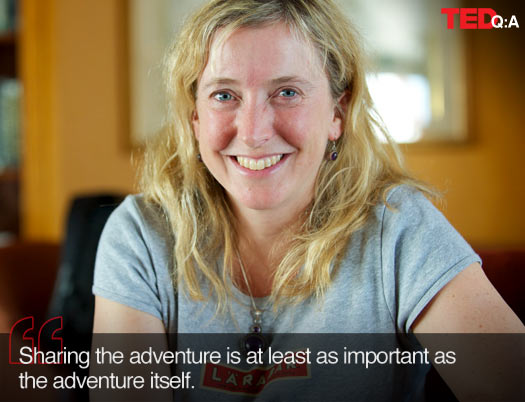
Roz Savage has just begun the third and final leg of her epic solo row across the Pacific. Yesterday we posted Roz’s TEDTalk from Mission Blue Voyage, where she attempts to answer the question: Why? In this email interview with the TED Blog, completed just days before she set out from Kiribati to row to Australia, Roz talks a bit more about her eco-motivations and about what she learned during the Mission Blue Voyage.
What about this voyage has had the greatest impact on you?
Before Mission Blue, I vaguely knew the oceans were in trouble, and I knew that this had big implications for the health of the entire planet, but the information had come to me in a steady drip-feed of bad news. To hear so many presentations in a concentrated span of time, and find out how many different aspects there are to the challenges, really brought it home to me how urgent is the need for us to take action. And if the presentations themselves were the bad news, the good news was that there are so many people, speakers and audience alike, who care passionately about the oceans and are firmly committed to protecting them from further destruction. So I left the conference cautiously optimistic about our chances of success.
What is your first or fondest ocean memory?
More beach than ocean, but … When I was about 18 months old, my family was on holiday in Filey, Yorkshire, in the north of England. I decided to go exploring, and set off to toddle determinedly along the beach. Knowing I was an independent little soul, my mother followed at a discreet distance, but became concerned when I showed no signs of tiring or wanting to turn back. When I paused to admire a shell, she seized her opportunity, and suggested that we go and show the pretty shell to my father. I might have hesitated, wanting to explore further but also wanting to show the shell to my father. The latter prevailed, and we returned to the family group. My attempt to become the first toddler to walk from Yorkshire to Scotland was thus thwarted. I think I would still make the same choice now — sharing the adventure is at least as important as the adventure itself.
One of the main goals of Mission-Blue.org, Sylvia Earle’s foundation, is to establish hope spots — marine protected areas where fishing is restricted or ended, to allow the oceans to rebuild and replenish. If you could establish a hope spot anywhere in the world, where would that be?
I’ve really enjoyed diving in the Maldives. In one particular dive we saw about twelve manta rays. The Maldives already has quite a number of marine protected areas, but one large one would be a lot more effective than lots of small ones. It is the connected ecosystem that needs protecting, not just individual spots that are particularly attractive to humans. Fish move around — and so do toxins and other threats to marine life. I feel desperately sad for the inhabitants of the beautiful Maldives that they may soon have to leave their homes due to rising sea levels, but if and when these islands become uninhabited by humans, maybe the ocean can become relatively pristine again.
If you could teach the people of the world one thing about the oceans, what would it be?
Everything is connected. Some people find it hard to care about the ocean, because they don’t live there and out of sight is out of mind. But this is a finite planet, and what goes around comes around. There is no “away” for things like toxins and plastic pollution. We have to look after the planet — oceans included — if we want it to look after us.
Follow Roz on her epic row with the RozTracker >>
For more wise words from Roz, check out this short video interview with Cody from National Lab Day.
Photo: TED / James Duncan Davidson
Comments